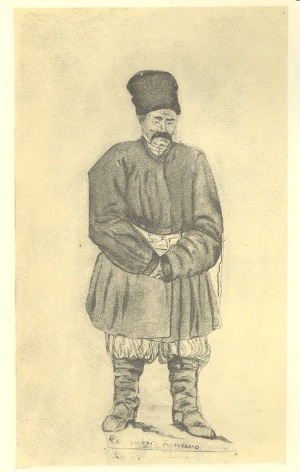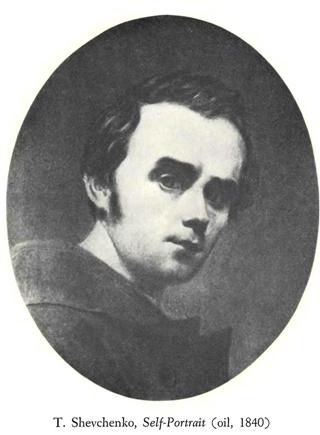TARAS SHEVCHENKO’S LIFE AND WORK
This is a part of "Taras Shevchenko’s life and work" by Professor C.H. Andrusyshen
(Introduction of "The poetical works of Taras Shevchenko. The Kobzar" by Constantine Henry Andrusyshen and Watson Kirkconnell)

Taras Shevchenko's father,
Hryhoriy Ivanovych Shevchenko
(1781 – April 2, 1825),
Painting made by T. Shevchenko
in 1829 – 1830Taras Shevchenko's ancestry has not as yet been established beyond the fact that his grandfather Ivan, according to the baptismal records of his parish church, was born in 1742 in the village of Kirilivka in the region of Kiev, and died there in 1849 at the age of 106. Ivan was a peasant, a serf1 belonging to the estate of the large landowning family, the Engelhardts, who were of German origin but by then were thoroughly Russianized. Little is known of him, except that as a young man of twenty-five he may have taken part in the peasant uprisings under the Haydamaks, the bloodiest of which occurred in 1768. At least he was its eye-witness; and so vivid were his tales of those events to his younger neighbours who used to gather at his house that the young, sensitive, and imaginative. Taras, who listened to them gapingly and wide-eyed, retained them freshly in his memory, and in due course was inspired to write his longest narrative poem, The Haydamaks, based mostly on the old greybeard's personal account of that carnage.
In Kirilivka too, in 1781, was born Taras' father, Hrihoriy, who in 1802 married Katerina Boyko, born in 1783 in the neighbouring village of Morintsi. For eight years the couple lived with Ivan, but in 1810 they moved to Morintsi, where on February 25 by the Julian calendar (March 10, Gregorian calendar), 1814, Taras was bom, the third of six children in all, three boys and three girls. The following year the family returned to Kirilivka, where they again settled with old Ivan.
Although a serf, Taras' father, owing much to his inborn intelligence, acquired a knowledge of reading and writing, a difficult attainment in those days when out of some 100,000 inhabitants of
*Most of the serfs were the descendants of the freedom-loving Cossacks who, as they reacted against political and social injustice, created in Ukraine at the end of . e sixteenth century an independent Cossack state which was suppressed by Russia eighteenth century. The vicissitudes of those champions of liberty will be more u% dealt with in the annotations to Shevchenko's pertinent poems.
Zvenihorod county in the province of Kiev there were only 105 literate persons. On that account Hrihoriy was not compelled to do forced labour in the fields, as were the other serfs, including his wife. (Officially, three full days a week were required of them in the service of the landlord, but much more extra labour was exacted by the master's overseers.) In addition, Hrihoriy learned a Cartwright's trade and eventually became a chumak or travelling carter. As such, he would seasonally transport goods to Kiev and to other more distant trading centres, including Odessa, and return with other merchandise which he bartered or bought. As a result, the life of the Shevchenko family, although hard enough, was not as unbearable as that of their fellow-serfs.

Taras Shevchenko, "Peasant family"
Taras' childhood was happy enough. He was well taken care of by his sister Katerina, eight years older than himself, who, while his mother toiled in the fields, looked after his needs. It was during this early period that the hoy's poetic imagination became so active as to make him once wander away from home to reach the place where, according to the folktales told him, steel pillars supported the sky; this excursion caused much anxiety to his sister whose tenderness towards him he acknowledged later on several occasions. Listening to his father read periodically from the Mineon (Lives of the Saints) further fed his phantasy and, in addition to his grandfather's stirring stories of the Haydamak period, was one of the chief predilections of his childhood. His artistic talent wasi likewise revealed at this early date when, on his own, he began to fashion clay models of birds and animals, as well as to paint figures and scenes on fences, barn walls, and wherever he found space available. Folksinging was also a favourite pastime of his tender years, and in his retentive memory were fixed numberless songs with which he, throughout his life, entertained his friends in the pleasing baritone with which he was gifted.
His first confrontation with the harsh reality of life occurred at the age of eight when his father sent him to the local diak (church cantor), Pavlo Ruban, to learn the three R's. For lack of adequate textbooks, his rudimentary education was a laborious two-year process, for he was forced to study from an antiquated primer, a breviary, and the Book of the Psalms, all written in the archaic Church Slavonic language. Moreover, whether he deserved it or not, together with others he was called upon to undergo the inevitable Sabbath treatment, the birching, that savage method of school discipline in the European schools of those days.
He was barely nine when his mother died at the age of thirty-seven. A few months later his father married a widow, Oksana Tereshchenko, who brought into his household three children of her own. The fostermother was a termagant not only to her husband but also to his children, particularly to young Taras, whose stubbornness irritated her greatly. To prevent as much as he could her harsh treatment of his son, the father would often take him on his carting journeys. During one of those expeditions the older Shevchenko caught a severe chill and shortly after his return home died in the early part of 1825, aged forty-seven, when Taras was about eleven. Life with the fostermother then became doubly intolerable, and many a time he had to seek protection from her by escaping to his eldest sister, who was by that time married and living apart.
For a time Taras attended the village school conducted by the local church cantor, Bohorsky by name, where he learned precious little and was compelled to perform various menial tasks for his teacher and his more fortunate fellow-pupils. Moreover, the cantor took advantage of the twelve-year-old Shevchenko's knowledge of the Book of Psalms and would often send him in his stead to read from it at the vigils for deceased serfs. A tenth of the fee he would give to the boy and retain the rest to keep himself in liquor. As Shevchenko admitted later in one of his autobiographical poems, he suffered such destitution at that time that he was occasionally compelled to steal money from the diak in order to buy paper on which to draw and copy his beloved folksongs. Once when the cantor lay stark drunk, young Taras availed himself of the opportunity to give him a sound drubbing as a revenge for the maltreatment he had often suffered at his hands.
A period of shiftless existence followed. For a while he lived with his older brother Mikita, who tried to accustom him to the settled life of a peasant, and often beat him for carelessness in the chores he was told to do. For a short time Taras served as a shepherd and as a herd of the community's cattle. It was then that he met the girl Oksana Kovalenko who exerted such a soothing influence on his childhood that the fond memory of her kindness lasted throughout his life, even though she later became wayward and scabrously involved in a love affair with a Russian soldier. The time Taras spent as a servant in the household of the priest, H. Koshetz, was perhaps the mildest of that period, but even there the work was very strenuous, the more so as wilful, impulsive, and recalcitrant nature began to assert itself increasingly, and his intensely meditative mind prevented him from concentrating his attention on the tasks assigned to him. His relations with his various masters were further complicated by his frequent disappearances when he wandered off, without permission, to neighbouring villages, seeking local rural painters who might teach him the art in which he dabbled by himself without achieving satisfactory results.
Introduction written by Professor C.H. Andrusyshen
Source: The Poetical Works of Taras Shevchenko. The Kobzar. Translated from the Ukrainian by С.H. Andrusyshen and Watson Kirkconnell. Published for the Ukrainian Canadian Committee
by University of Toronto Press, 1964. Toronto and Buffalo. Printed in Canada, Reprinted 1977, p. 9 - 12.
Read more:

Introduction of "The poetical works of Taras Shevchenko. The Kobzar" by Constantine Henry Andrusyshen and Watson Kirkconnell.



Ukrain